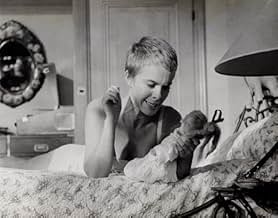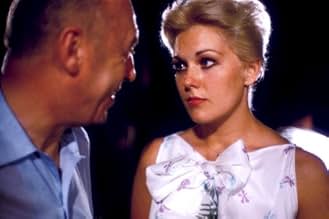IMDb RATING
6.8/10
5.9K
YOUR RATING
Spoiled Cecile, 17, spends her summer at the French Riviera with her rich, widower, playboy dad and Elsa. Anne, her late mom's friend, visits and brings changes to all.Spoiled Cecile, 17, spends her summer at the French Riviera with her rich, widower, playboy dad and Elsa. Anne, her late mom's friend, visits and brings changes to all.Spoiled Cecile, 17, spends her summer at the French Riviera with her rich, widower, playboy dad and Elsa. Anne, her late mom's friend, visits and brings changes to all.
- Nominated for 1 BAFTA Award
- 2 nominations total
Tutte Lemkow
- Pierre Schube
- (uncredited)
Maryse Martin
- Undetermined Secondary Role
- (uncredited)
Edouard F. Médard
- Bit part
- (uncredited)
Jackie Raynal
- Dancer
- (uncredited)
- Director
- Writers
- All cast & crew
- Production, box office & more at IMDbPro
Storyline
Did you know
- TriviaOtto Preminger always liked this film, although he felt the American critics did not do it justice. The film was a qualified success in France, yet American critics felt the film wasn't French enough, a detail that amused Preminger.
- GoofsWe hear the Band at c.6'50" and we see a clarinet-player performing, but the music has no clarinet part whatsoever included at that point in the soundtrack. Later, when the clarinet does eventually join the soundtrack, the fingering of the player bears absolutely no relation to the music actually being heard.
- ConnectionsEdited into Histoire(s) du cinéma: Une histoire seule (1989)
Featured review
Film makers love to show off the Rivera, and for good reason. It's one of the most spectacular venues in the world. However, it's interesting to compare Preminger's Rivera with those of Hitchcock in "To Catch a Thief" and Powell's in "The Red Shoes". In "The Red Shoes" the Riviera is merely a setting in which artists work obsessively to create their art while paying virtually no attention to it. For Hitchcock, the Riviera is a lush background for intrigue. In Preminger's "Bonjour Tristesse" the Riviera represents the lifestyle that the characters desire; luxurious, sensual, hedonistic and, ultimately, empty. "Bonjour Tristesse" is worth seeing for the Riviera, which looks fabulous, and Jean Seberg, who looks fabulous. However, the story is as shallow as the characters.
I do not think that it would be giving away the plot to say that the viewer is led to believe from the very beginning that he is seeing a tragedy. After all, the title translates as "Hello, Sorrow". Furthermore, the opening exposition, filmed in somber black-and-white, leads one to believe that the lives of the protagonists have been devastated by some great tragedy. However, from the very beginning it is also obvious that this impression is not true at all. The father and daughter are depicted as a pair of shallow, selfish, hedonists who care nothing for anything or anyone beyond each other and their own immediate gratification.
The story does not even mention exactly what, if anything, it is that the father does for a living. He is obviously extremely wealthy, but is never seen to do any sort of work or transact any business. It was apparently sufficient for the author that he should be nothing more than a rich, idle, middle-aged playboy who changes his cars as frequently as his daughter, who never wears the same outfit twice, changes her clothes.
In short, not only are the characters in this story not real people, they are not even sympathetic unreal people. It's bad enough having to put up with an hour and a half movie about mannequins without them having to be unlikable mannequins.
I do not think that it would be giving away the plot to say that the viewer is led to believe from the very beginning that he is seeing a tragedy. After all, the title translates as "Hello, Sorrow". Furthermore, the opening exposition, filmed in somber black-and-white, leads one to believe that the lives of the protagonists have been devastated by some great tragedy. However, from the very beginning it is also obvious that this impression is not true at all. The father and daughter are depicted as a pair of shallow, selfish, hedonists who care nothing for anything or anyone beyond each other and their own immediate gratification.
The story does not even mention exactly what, if anything, it is that the father does for a living. He is obviously extremely wealthy, but is never seen to do any sort of work or transact any business. It was apparently sufficient for the author that he should be nothing more than a rich, idle, middle-aged playboy who changes his cars as frequently as his daughter, who never wears the same outfit twice, changes her clothes.
In short, not only are the characters in this story not real people, they are not even sympathetic unreal people. It's bad enough having to put up with an hour and a half movie about mannequins without them having to be unlikable mannequins.
- robertguttman
- Mar 15, 2019
- Permalink
Details
Box office
- Gross worldwide
- $446
- Runtime1 hour 34 minutes
- Color
- Aspect ratio
- 2.35 : 1
Contribute to this page
Suggest an edit or add missing content




































